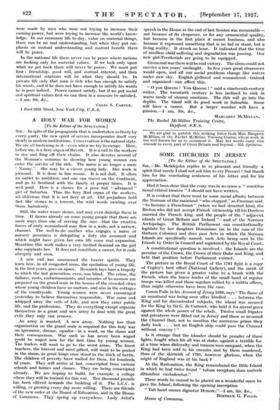SOME CHURCHES IN JERSEY - [To the Editor of the
SPECTATOR.]
Meildejohn replies in so pleasant and friendly spirit that surely I shall not ask him to cry Peceavi ! but thank him for the concluding sentences of his letter and for his appreciation.
Had it been clear that the essay was in no sense a " constitu* tional ethical treatise" I should not have written.
It is evident that there must be some racial affinity between the Norman of the mainland "who stopped," as Freeman said, "to become a Frenchman" (when we had deserted him), the Breton who did not accept French citizenship till his Duchess married the French king, and the people of the "adjacent islands of Great Britain and Ireland"—and of the Norman Archipelago. The British Parliament can constitutidnally legislate for her daughter Dominions (as in the case of the thirteen Colonies) and does pass Acts in Which the Norman Islands are specifically named, such Acts being sent -to' the Islands by Order in Council and registered by the Royal Court.
A constitutional question is involved : the Islands are the peculiar Of the Crown, the Crown of their Duke and King, and held that position before Parliament existed.
The picture in the Royal Court of the 1781 fight is a copy of Copley's best effort (National Gallery), and the merit of the picture has given a greater value to a brush with the French, when the brave leader of the small band of regular troops was killed and those regulars rallied by a militia officer, than might otherwise have been the case.
Canon Falk in his Account of Jersey 1698, says 'The flame of an unnatural war being soon after kindled . . . between the King and his discontented subjects, the island was secured for the King by Sir G. de Carteret, who held it for several years against the whole power of the rebels. Twelve small frigates and privateers were fitted out in Jersey and these so invested the Channel that, not to mention the numerous prizes they daily took . . . not an English- ship could pass the Channel without convoy ! "
Is it strange that the islander should be prouder of these fights, fought when his all was at stake, against a terrible foe at a time when disloyalty and treason were rampant, when the King had been sold to his enemies and by them murdered, than of the skirmish of 1781, however glorious, when the might of England was at his back ?
At the Restoration, the King remembered the little Island in which he had twice found " tutum recepturn durn coeteris ditionibus excluderetur."
These words he caused to be placed on a wonderful mace he gave the Island, following the opening inscription
"Tali haud omnes dignatur Honore."—I am, Sir, &c.,
BERTRAM G. FALLEe Howe of Commons.














































 Previous page
Previous page